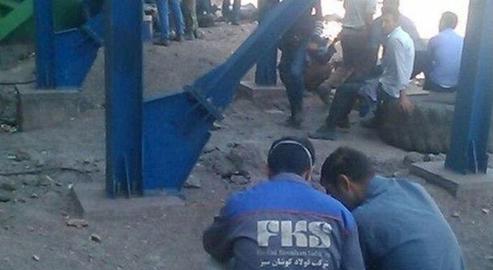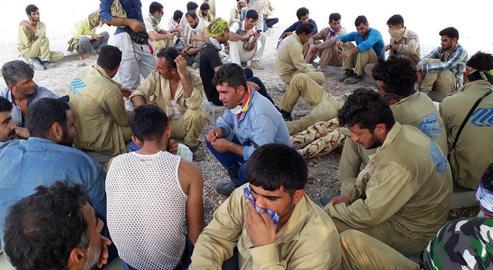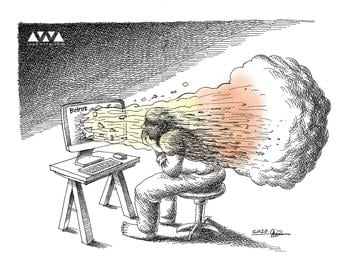A wave of strikes by oil, gas and petrochemical sector workers in Iran has now reached Isfahan refinery and Tabriz thermal power plant.
The industrial action, which began in four southern provinces on Saturday, August 1, is the biggest downing of tools across companies run by the Oil Ministry in the last 40 years. The firms affected employ some 10,000 workers across at least 29 affected oil and petrochemical refineries.
The protesters are demanding better job security, an end to of blank contracts, salary increases and payment of wage arrears, improvements to dormitories and health facilities, and insurance payments based on real payroll salaries. These workers insist that they will continue to strike until their demands are met. Many of those protesting have not been paid for months.
One of the strike participants, who works at the South Pars gas complex in Bushehr province, said that “for unknown reasons” subcontractors on his site were not being paid according to the agreed terms. People in his firm, he said, were entitled not only to a monthly wage but to an annual increase as per the Directorate of Labor’s bylaws and bonuses based on the increased production of gas products.
"Some items are not in the contract,” he said, “but in previous years we were always paid based on convention. They have been smart and have not committed to it in the contract.
“But non-payment of salaries over the past few months is a priority for us now. In this unfortunate economic situation and with high costs to meet, it is impossible for us to work without receiving a salary – and in this unbearable heat."
Another worker said those on strike had pursued all legal means of redress before resorting to industrial action. "Before going on strike,” they said, “we went to the Labor and Employment Services Department of the South Pars Special Economic Energy Zone.
“In a letter to the CEO of the South Pars Gas Complex, we spoke to the people's representative in the south of the province, Mr. Sheikh Musa Ahmadi, who is also a member of the parliament's energy committee.
“We repeatedly asked the physical protection office of the South Pars Special Economic Energy Zone to tell to our employers to pay our salaries, insurance, and other overdue and unpaid benefits. Unfortunately, the managers' response was nothing. It yielded no results for us workers."
Blocked From Employment Rights at Every Turn
This employee says the management made promises that have never been fulfilled. Instead the response to individual complaints, he says, has been suppression, threats and expulsions. “Go to the courts of the cities of South Pars,” he says. “Most of the district court cases consist of workers' complaints, which has led to the dismissal or suspension of the worker."
The workers believe that establishing syndicates or trade unions might facilitate their demands. “Not only is there no workers' union or syndicate in the region,” one worker says, “but the Labor and Employment Services Department and the Physical Security Office, which are directly managed by the IRGC’s intelligence services, oppose its formation. People who have legitimately pursued the formation of a trade union have been fired and even barred altogether from working in the region. Their names are blacklisted and they cannot enter or operate in the area."
Those on strike claim that in addition, decisions about security in the South Pars Special Economic Energy Zone are made under the direct supervision of the IRGC, independently on the gas complex management.
“Each part of the complex consists of several small and large refineries,” one said. “Workers in these phases cannot move from one to another or from one zone to another without an intelligence office permit. This has made it difficult for workers to gather and unite, and it has not been possible to make collective demands. Now in some parts of South Pars, apart from demanding arrears, they want the sub-contractors to be removed outright and the salaries to be increased."
One of those present likened management of the complex to a “mafia”, with any voices demanding workers’ rights silenced. "Many times, people have been selected as spokespersons and representatives in coordination with the regional labor office and security apparatus – but they were fired shortly afterwards, on various pretexts."
"Every time,” says another, “due to the intervention of law enforcement bodies, our voices have been silenced without promises being fulfilled or demands being met. But this time, the workers of all units and companies have come out in protest. This was the fire under the ashes and this time, it won’t die out so fast."
Solidarity is the Way Forward
Peyman Shajirati, a labor activist in Turkey, told IranWire there is a political dimension to this wave of unrest that could affect the strategic position of the industry. “More and more sections of the complex are joining the strike on a daily basis,” he noted. “It is expected that more sections from the oil industry and even other sectors will join in time.
“For many years, workers in this industry have been exploited with temporary or blank contracts – or even without any contracts at all – and today, these suppressed grievances have reached boiling point.”
He said if the workers’ grievances, which are all the normal preserve of trade unions, remain unaddressed, they may resort to taking political action instead. "Workers have been protesting for years against discrimination, inequality, below-poverty-line wages, inflation and rampant price hikes. Despite repression, detention, imprisonment and dismissal, they have not retreated and have continued to strike.
“Today, the workers of the various units, with the experience they have gained over the years, have achieved a balance of power. They have come to understand that the way out of the current situation is solidarity with other workers and joining general widespread strikes."
visit the accountability section
In this section of Iran Wire, you can contact the officials and launch your campaign for various problems


























comments